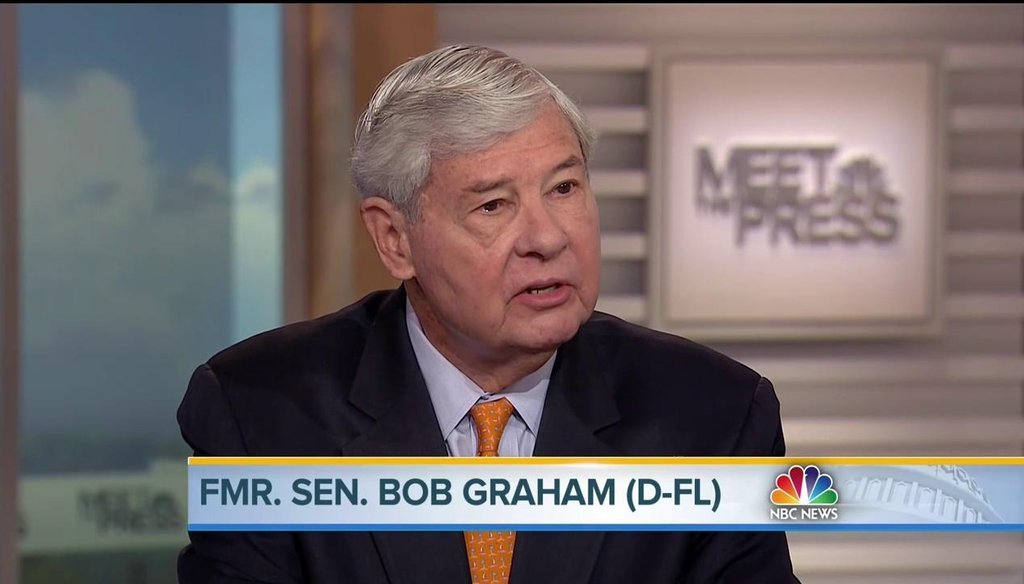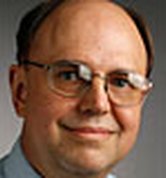Stand up for the facts!
Our only agenda is to publish the truth so you can be an informed participant in democracy.
We need your help.
I would like to contribute

Former Sen. Bob Graham wants the U.S. government to release a classified report about Saudi Arabia's possible role in the Sept. 11 attacks on April 24 on NBC's "Meet the Press." (NBC News)
Former U.S. Sen. Bob Graham, D-Fla., said Sunday that the White House will decide by June whether to release sealed pages of a congressional report that explore links between Saudi Arabia and the Sept. 11, 2001, terror attacks.
Graham, Senate Intelligence Committee chairman at the time, has long advocated the pages be made public and made the case again on NBC’s Meet the Press.
Saudi Arabia, an American ally in the Middle East, has vigorously denied any connection to the hijackers for years.
"To me, the most important unanswered question of 9/11 is did these 19 people conduct this very sophisticated plot alone, or were they supported?" Graham said. "I think it's implausible to think that people who couldn't speak English, had never been in the United States before, as a group were not well-educated could have done that. So who was the most likely entity to have provided them that support?
"And I think all the evidence points to Saudi Arabia. We know that Saudi Arabia started al-Qaida. It was a creation of Saudi Arabia.
Sign up for PolitiFact texts
But Graham's phrasing could leave people believing the Saudi government itself created the terrorist organization. The truth is fuzzier, so his statement rates Half True.
Al-Qaida was started in an effort, largely backed by Saudi Arabia, to force the Soviet Union out of Afghanistan. The government did not, strictly speaking, create the organization. It was the product of jihadists wanting to continue the fight after the Soviets left, using the funds of Saudi backers to do it.
It prospered because of donations from Saudi interests, including groups tied to the government. The Saudis deserve significant responsibility for its existence.
When we heard back from Graham, he directed us to a 2003 Wall Street Journal article that reported how some wealthy Saudi families were "among the first financial supporters of Osama bin Laden." However, as the article notes, that support came as bin Laden was transitioning away from fighting the Soviets. The families involved have denied funding the al-Qaida-involved terrorist attacks.
"Osama bin Laden's personal wealth mattered tremendously when the group was formed in 1988. In a way this wealth was ‘Saudi’ in that his family was a Saudi family, but it's different than the Saudi state or Saudi organizations," Daniel Byman, research director at the Center for Middle East Policy at the Brookings Institution, told PolitiFact.
Over time, Byman said, bin Laden lost his money, and a network of wealthy donors from largely Gulf states, including Saudi Arabia, supplied al-Qaida’s funding.
Daveed Gartenstein-Ross, a senior fellow at the Foundation for Defense of Democracies, said there was so much Saudi-based support from individual Saudis and organizations that directed money from the Saudi government that Graham’s statement "is a bit under-nuanced."
"It's clear you had government money that went through these charities," he said. "And while you could talk about lack of oversight for these charities, which used to be the line the government used, mere lack of oversight doesn't fully explain the government's position."
Sanders: The poor don’t vote
Todd pressed Democratic presidential candidate Sen. Bernie Sanders about how much longer he will stay in the race with his chance to win the Democratic primary growing more dim, thanks in part to poor voters at the core of his campaign message.
"So 17 of the 25 states with the highest levels of income inequality have held primaries. Sixteen of those 17 states have been won by Hillary Clinton, not by you," Todd said. "Why?"
Sanders’ response was simple: Poor people don’t vote. "I mean, that’s just a fact. That’s a sad reality of American society," he said.
Sanders continued, "But in America today, the last election in 2014, 80 percent of poor people did not vote."
The data shows that we’ve done slightly better at getting out the vote among low-income people than what Sanders suggests, but not by much. His statement rates Mostly True.
Sanders’ policy director Warren Gunnels showed us a report by the left-leaning policy and advocacy group Demos, which used data from the Census Bureau. The report found roughly 75 percent of people in the lowest income bracket, meaning they earned less than $10,000, did not vote in the midterm elections.
However, there’s a catch: While an annual income of less than $10,000 is undoubtedly "poor," the poverty threshold in 2014 also includes family incomes above $10,000. So we broadened the focus to annual incomes under $30,000, which had a turnout rate of 31.5 percent. Put another way, 68.5 percent of poor people didn’t vote in 2014, about 10 percentage points less than what Sanders said.
For many poor Americans, the act of voting is one more thing they cannot afford.
"They can’t afford to take time off from work to vote. They are dealing with more major problems like trying to find the next paycheck. They are just more stressed than those are more well-off," said Zoltan Hajnal, a political science professor at the University of California, San Diego. "Politics seem like a more distant phenomenon and less pressing for them because there so many other things that they have to deal with."
Our Sources
See fact-checks.






































